Immunology and Allergology >>>> What are bacterial lysates
What are bacterial lysates.

Recently there has been a growing interest in the prevention of respiratory infections, as one of the most common human diseases. The methods associated with the use of immunostimulants in this area are especially attracting attention . And in this regard, articles on bacterial lysates began to appear more and more in the medical literature. In the instructions for medicines, you can find the term "bacterial lysates". What are bacterial lysates and how are they used?
Any bacterium is considered as a microorganism and has a certain biological structure, enclosed in a shell. Mechanical (and / or chemical) destruction or dissolution of the shell causes the death of the bacteria as an organism. The very process of destruction of the shell is called lysis. Lysate is a lysis product (its result is microorganism particles). Accordingly, bacterial lysates are products of bacterial lysis.
Depending on how (with what) the destruction of the bacterial shell occurs, all lysates are divided into groups:
- Phagolysates - the results of lysis by bacteriophages;
- Autolysates are lysis products as a result of the action of enzymes;
- Hydrolysates are the results of the action of salts, alkalis, acids on the bacterial shell.
The use of bacterial lysates for the prevention of diseases is similar in mechanism to the use of vaccines, the only difference is that in the case of a vaccine, weakened or killed strains of viruses or bacteria are used, and in the case of bacterial lysates, the results of specific lysis of certain bacterial strains are used. The goals of both vaccines and lysates are similar - to trigger a response from the immune system even before a massive attack by pathogenic microbes of the human body begins.
Bacterial lysate, entering the human body, is perceived by the immune system as foreign and provokes the production of antibodies, lysozyme, macrophages and lymphocytes.
The question arises, why is it necessary to "turn on" the immune system before the infection enters the body? Ideally, the immune system should respond to an infection immediately, but when immunity is weakened, the response can be "delayed", which allows microorganisms to quickly colonize tissues and organs. And in this case, the immune system can no longer cope with the infection on its own, requiring drug support, which in turn causes side harm to the rest of the body's systems. With the help of bacterial lysates, the immune system at the time of the attack of microorganisms is already in good shape and meets them “in all weapons”.
Bacterial lysates are considered as immunostimulants of bacterial origin. They are of two types: topical and systemic. Lysates of bacteria of topical action (sprays and tablets for resorption) have disadvantages, since they are quickly removed by the cilia of the epithelium or washed off with saliva, without having time to fully interact with antibodies. Systemic bacterial lysates stimulate the immune cells of the gastrointestinal tract (causing a specific and nonspecific response of the immune system) and have an indirect effect on pathogens.
To obtain bacterial lysates, strains of pathogenic bacteria are used, which are the most common cause of respiratory infections. As a rule, lysates of not one but several types of bacterial strains are used. The sets of bacteria from which the lysates are obtained are described in the instructions for the preparations in the "active ingredient" section.
Although bacterial lysates are already on the pharmaceutical market, there is still no convincing evidence that their effectiveness is undeniable. Research in this area is ongoing, and scientists see these studies as promising for reducing the risk of respiratory disease.

Read

Read



























